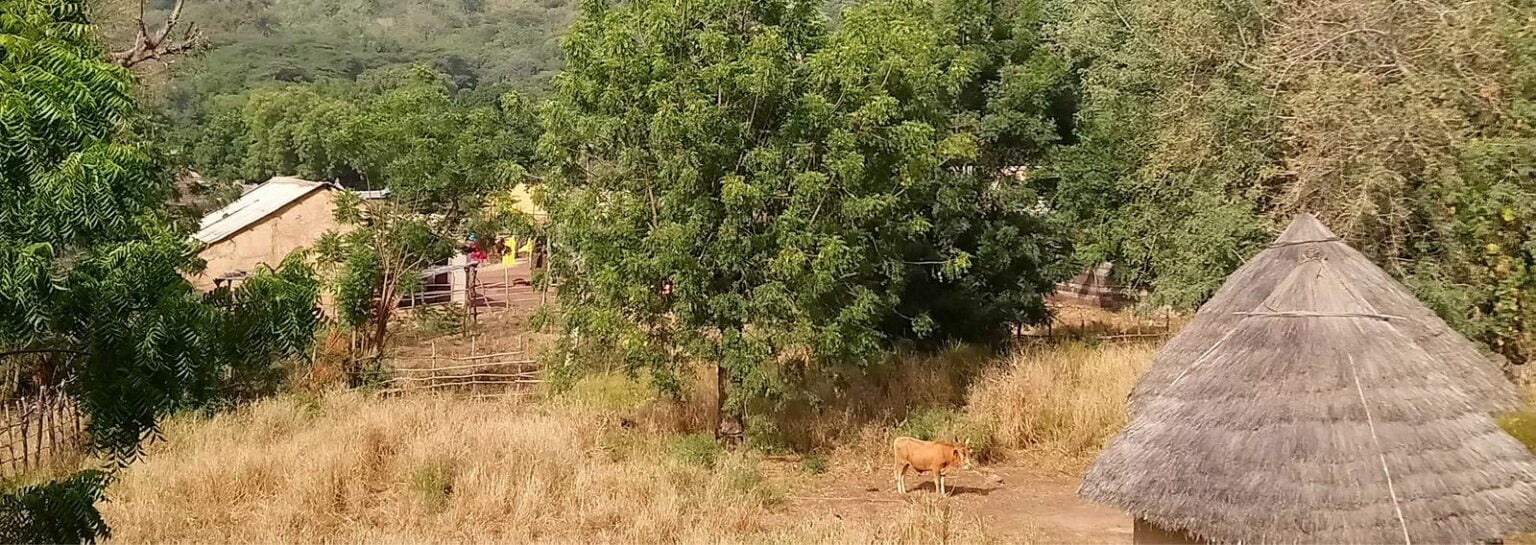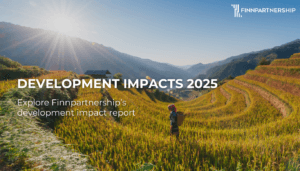Arbonaut: Turning forestry into sustainable business all around the world

Arbonaut is a technology company on a mission to make the world a better place. Some of its techniques for achieving that include sustainable forest protection and timberland management. When Arbonaut was able to recruit an expert on Africa, it gained opportunities for conducting business in a large number of new countries.
“Once you have spent time in Africa and learnt to know the people there, somehow Africa never leaves you,” says Jarno Hämäläinen.
Hämäläinen is the head of the REDD+ unit at Arbonaut, a company based in Joensuu, Finland. Hämäläinen regularly visits the African continent, but these days his travel days add up to less than two months per year.
According to Arbonaut’s President and CEO Tuomo Kauranne, it is specifically thanks to Hämäläinen that the company has gained a good foothold on the continent.
Originally hailing from the company’s own northern Karelian home ground, Hämäläinen first landed in Africa soon after finishing his studies, due to his wife’s job. He ended up getting his first jobs in his own field during that same sojourn in Tanzania and Mozambique. After a few twists and turns of life, Hämäläinen eventually returned to his native ground in Joensuu, and that was the start of Arbonaut’s conquest of Africa.
Contacts on the new continent
Arbonaut is a company from eastern Finland that specialises in modelling forests. Practically at the same time as Hämäläinen joined Arbonaut, the company established its REDD+ unit, which focuses on sustainable forestry. Hämäläinen is now at the helm of that unit. REDD+ (Reducing Emissions from Deforestation and Forest Degradation in Developing Countries) is a programme that runs under the auspices of the United Nations, aiming at preserving forests, growing carbon sinks, and promoting sustainable timberland management.
What Arbonaut does in practice is to sell its know-how – consulting and training – to developing countries that are formulating their REDD+ strategies. In Finland, technical solutions play a more central role.
“From the start, our target areas have been very exotic,” Hämäläinen says.
Arbonaut has REDD+ projects all around the world, reaching from Nepal to Ethiopia and Vietnam.
The company reached Africa thanks to Hämäläinen’s contacts. The company noticed a Norwegian tendering process concerning consulting on the establishment of a National Carbon Monitoring Centre in Tanzania. As the name indicates, the centre’s purpose would be to monitor carbon in Tanzanian forests and report to the UN on the operation of the country’s green carbon sinks.
Hämäläinen gathered together a team of researchers and experts whom he knew from his years in Tanzania and Mozambique, and they were able to win the bidding.
Tanzania was a suitable first African landing place for Arbonaut, as Hämäläinen knew it so well and had a good network of contacts there. Since then Tanzania has gone on a back burner, but there are new projects in countries such as Ethiopia, Senegal and, lately, Uganda. Hämäläinen may also get to work with his old home country of Mozambique, too, as there have been talks on a project there.
Keeping doors open
Arbonaut tested its wings in many fields and even came close to shutting down before deciding to focus purely on forestry, explains CEO Tuomo Kauranne.
Internationality has always been at the heart of the company’s operations: it has staff from 15 countries, or 20 if you count the project teams around the world. Internships are the main channel for recruitment; Joensuu hosts many international Master’s students, for whom the company’s doors are open. When all goes well, an internship can lead to a whole career.
“We keep our doors open wide and our ceiling high,” Kauranne says. “Tolerance is key.”
Besides cosmopolitanism, another important principle for Arbonaut is doing good in the world. Kauranne stresses that money is not an end in itself but a tool towards more important objectives.
“We are a technology company with a philanthropic mentality,” he summarises.
Consulting is only the first step
Arbonaut starts working in African countries by conducting consulting projects related to climate change, explains Jarno Hämäläinen.
This helps the company obtain contacts and examine the operating environment. Hämäläinen feels that it is often beneficial for the first project to be fairly small. If you start off big without knowing the environment or local partners very well, you may be faced with too many surprises.
“First we advise, and then, once we’ve understood what sorts of services may be needed, we can start to offer them,” he says. If all goes well, the company can end up building information systems with cloud-based support structures, for example.
Arbonaut starts its African endeavours via tendering processes. Often these relate to creating a REDD+ strategy, forestry plan or similar initiative for a country’s forest agency. Often the project is financed by the World Bank or an international climate fund.
Hämäläinen believes that local partners are an important asset in these bids, which cannot be won without a good local presence. The applicants’ personal CVs are also very important.
Out of silos and into the fields
REDD+ projects support agrarian livelihoods and sustainable forestry. The aim is to reduce forest loss and weakening of the biomass. Technically, this may mean calculating carbon emissions and carbon binding. The work is multidisciplinary, forcing Arbonaut to learn about things outside of its core interests of forestry and technology.
“Often the best solutions related to forest protection may be found within the agriculture or energy sectors,” Hämäläinen explains. Considerations that must be taken into account include land ownership and legal terms.
For example, if it is found that forests are being cut down to make fields, it may be best to improve agricultural efficiency in existing fields. In Senegal, efforts were made to promote firewood-saving cookers and to teach people to make use of non-wood-based fuel, such as woodland tree fruits. This reduces the interest in chopping down forests. At the same time, the company gathered information on forests using mobile applications, and mapped land use based on satellite pictures.
“We like the fact that the REDD+ projects break against the tradition of forestry people talking to forestry people. This is in essence a multidisciplinary initiative, which means giving up any silo mentality,” Hämäläinen says.
International competence is crucial
A company that sells know-how has to have thorough knowledge of its operating environment. This does not have to be laborious, however.
Arbonaut has multinational project teams on site, one-person offices in several countries, and sometimes even project branches. In general, however, the company does not want to expend a lot of resources on maintaining offices. It carries out global remote work, which these days is surprisingly viable, according to Hämäläinen.
“We operate on a highly mobile and agile basis,” he says. Many international contacts are actually made in Joensuu, which is a very popular location for visiting within the forestry sector.
In Hämäläinen’s view, if you choose your local partners well, you avoid having to endlessly build up your own air miles and carbon footprint. All you have to do is attend key meetings and visit occasionally to lay the ground for future operations.
“We do have team leaders who make focused trips for other purposes, too, but usually our local partners take care of our everyday presence.”
It is often said that confidential personal relationships are of primary importance in African countries. Arbonaut’s first African team was made up according to that principle. In that sense, remote work can sound counterintuitive.
“Naturally friendships are important, but as I said at the start: once you have built good foundations, that helps,” Hämäläinen explains.
“In these countries, people are used to family members living in different places for most of the year due to work. Many international partnerships are also based on the idea that people never leave completely; they may visit other places but they will always come back.”
In other words, Jarno may be in Joensuu, which, viewed from an African perspective, is at the end of the earth, but he can still be present in everyday operations. He might be visiting Finland but he’ll return to Africa one day.
Arbonaut and Finnpartnership have carried out diverse forms of collaboration. Finnpartnership has presented Arbonaut in its Doing Business with Finland seminars abroad, and additionally Arbonaut is a member of Finnpartnership’s current Somalia Pilot group.
Source: Pasi Nokelainen & Esa Salminen: Afrikan valloittajat (Avain kustannus 2018)
Share on social media


